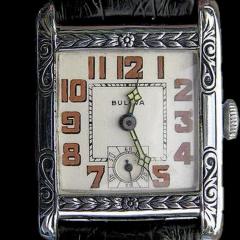Rust on screws
-
Recently Browsing
- No registered users viewing this page.
-
Topics
-
Posts
-
By nevenbekriev · Posted
No problem to replace the setting with the staking set. Press the new setting from inside, use flat face punch with hole. The punch must be wider than the setting, the hole to be as not to press at the stone, but only on the bush. Press by hand until the setting gets flush with the plate surface, so the punch must rest on it. -
By nevenbekriev · Posted
Yes, the arbor usually makes about 3 to 3.5 turns. But usually spring takes 2/3 to 3/4 of the free space in barrel, not 1/2, so take it for the calcullations. This way the change in torque is smaller. I have a picture for You, this one is little older, but no mater -
I overhauled a ladies Rolex and noticed erratic performance so I stripped in down again and did fault finding. This is what I saw. The lower jewel (the one in the plate) is cracked and the hole is too big. Before discovering this, I stripped down and re-cleaned the main-plate (and parts) by hand with a fine natural fiber brush. I somehow missed the fault the first time and cannot understand how it was still running. Perhaps re-cleaning it dislodged some pieces of the jewel widening the hole? I don't know. Now I need to replace the jewel but don't have a Seitz tool. The Rolex part is 2130-0913 and the top and bottom are the same. The part comes complete in brass setting with KIF elastor spring and cap jewel. Note: I have never replaced a jewel. I do have a good vintage stacking set that I've used quite a bit. Can I replace using a stacking set? Any suggestions would be greatly appreciated.
-
Is there a tech sheet available for the 6601? I've only been able to find a parts list. If there isn't one, would there be one available that is close enough to follow along with?
-
By Neverenoughwatches · Posted
I've used expanding foam for lots of things but i thinķ you got me on that one.
-





Recommended Posts
Join the conversation
You can post now and register later. If you have an account, sign in now to post with your account.
Note: Your post will require moderator approval before it will be visible.